Bob Marley wrote some of his first songs living in Wilmington. This is his Delaware history.
Editor's note: The story below is as it was originally published on Sept. 30, 2021. We are republishing this story in honor of the "Bob Marley: One Love" film opening on Valentine's Day. The 30th annual Peoples Festival will be held on Aug. 31, 2024.
It's the night before Woodstock and a 24-year-old Bob Marley is in an unseasonably cool Wilmington.
He's up late, helping his friend Godfrey "Ibis" Pitts, who senses a money-making opportunity and is busily making jewelry to sell at the New York music festival the next day.
At the time, Marley is not the legendary reggae singer he would grow into. It's four years before the release of "Catch a Fire," his Island Records debut featuring the international hit "Stir it Up."
As Marley helps, Pitts is trying hard to persuade the future reggae icon to come with him to the festival, which itself would earn iconic status with performances by Jimi Hendrix and others in front of 400,000 music fans.
"I was all excited about going up there," Pitts told Delaware Online/The News Journal before his 2013 death. "We stayed up all night doing that and he still wouldn't go. He kept a very low, low profile."
That's right. Bob Marley was almost at Woodstock in 1969, but not to perform. Rather, the man who would go on to sell 75 million albums was going to be helping a Wilmington jewelry-maker sell his wares to hordes of hippies.
It's that local legacy of a global music superstar that's at the heart of Peoples Festival, Saturday's 27th annual celebration of Marley and his music at Tubman-Garrett Park (Water and S. French streets in Wilmington) from 2 to 10 p.m.
The festival is free and features reggae, roots, and rock acts including Philadelphia ska/soul/reggae band Rk$tdy, along with Josh David Barrett with Judah Tribe (he also sang with The Wailers), Wilmington's own Spokey Speaky and more. (Go to peoplesfestival.com for a complete line-up and details.)
Wait. Bob Marley lives in Wilmington?!?
After his father died in 1955, Marley's mother Cedella Booker met and married Edward Booker while visiting her sister in Wilmington. They decided to settle in Wilmington and a young Marley moved here in the 1960s.
Over the years, accounts have varied about when he arrived and how long he was a full-time Wilmington resident. In the past, The Bob Marley Foundation website has stated he lived in Wilmington on and off from 1965 to 1977.
While 1977 is certainly when Booker moved to Miami, ending Marley's Delaware visits, he actually arrived two years earlier in 1963 when he was 18, according to a rare interview Booker gave the newspaper in December 1976.
Booker told then-News Journal scribe Jennie Phipps that her teenage son "hated" leaving his native Jamaica.
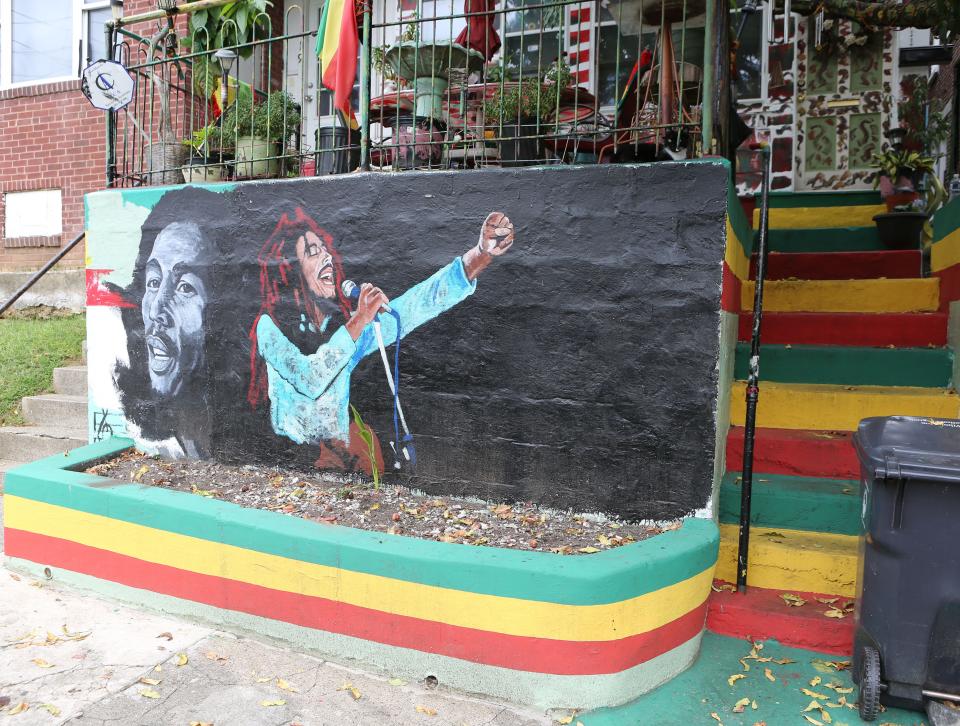
"He was here about a year and the only time I really saw him happy was when he knew he was going back to Jamaica," Booker said. "He didn't go out. He would say he preferred to stay here [in the house].
"He had a little book and he would write the words that came to his mind, then take his guitar and pick out a tune until he had something."
After leaving Delaware, he would return to visit and sometimes even live after marrying Rita Marley in 1966. In fact, his son Stephen Marley was born in Wilmington in 1972 and lived with Booker for a time, along with Marley's daughter Cedella (named after her grandmother) and another Marley son, Ziggy.
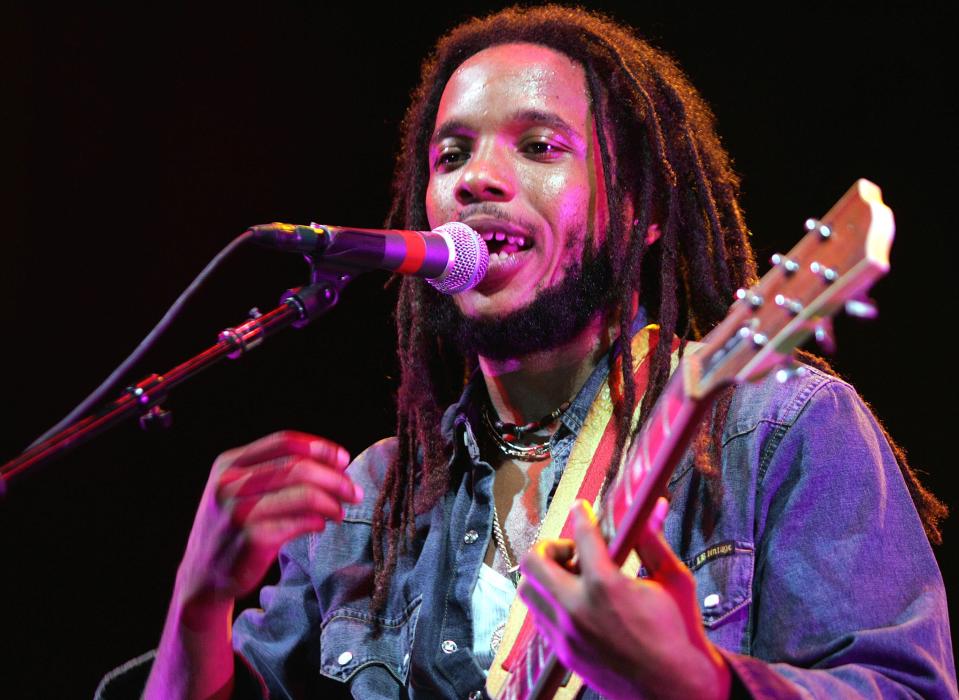
Both Stephen and Ziggy Marley have gone on to have Grammy Award-winning musical careers of their own.
At the time, all three Marley children attended public school, taking classes at the former George Gray Elementary School at 22nd and Locusts streets, which closed in 1992.
During his time in Delaware, Marley had several jobs, his mother told The News Journal. They included a short stint as a lab assistant at DuPont and later working the line and driving a forklift for Chrysler.
His 1976 song, "Night Shift," is believed to be about his time working in Newark. "Working on a forklift/In the night shift," he sings.
Booker didn't keep quite as low a profile as her son. While in Wilmington, she ran a shop on Market Street called Roots, which carried recordings by Marley and other Jamaican musicians.
In September 1976, at the urging of her son, she closed the store after a string of burglaries. By the next year, Marley moved her to Miami, where she died in 2008 at the age of 81.
'There was a giant cloud of smoke that came out with him'
When Marley arrived in Delaware as a musically unknown teenager, his appearance rightfully went without notice. But even into the mid-to-late 1970s when he would visit his mother during downtime or a Philadelphia tour stop, he stayed largely under the radar.
In fact, a search of The News Journal archives only turns up a pair of articles, including the 1976 interview with his mother. The other came July 3, 1977 when columnist Al Cartwright write about a picnic Marley attended in Wilmington that weekend.
It's the only time the newspaper interviewed or photographed the singer. It appeared as the third item in a column tucked away on page 3 after a list of that week's notable birthdays. It included a small photograph of Marley with a maraca in his left hand at the picnic, held on the Brandywine Creek at N. Heald Street.
Cartwright described a bunch of teenagers crowding Marley more in awe of his dreadlocks than his fame as a musician.
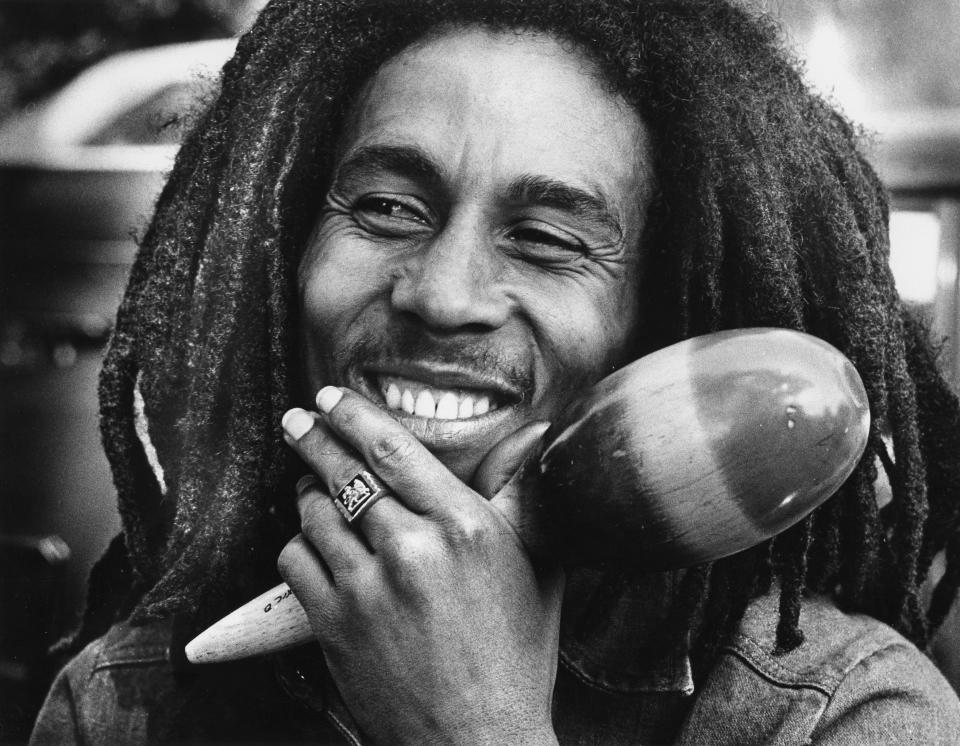
His visit came a few months after he was arrested in London for cannabis possession. Cartwright quoted Marley, who he described as sitting against a car on the fringes of the picnic, as saying, "I don't say drugs are okay. I say herb is right. I never use cocaine. I never use any other thing to get you high. I don't know if it is the religion, but it is who I am."
It's been 44 years since that day and although he admits his memory is hazy, former News Journal reporter, editor and rock critic Hugh Cutler remembers it well enough. He was there, too.
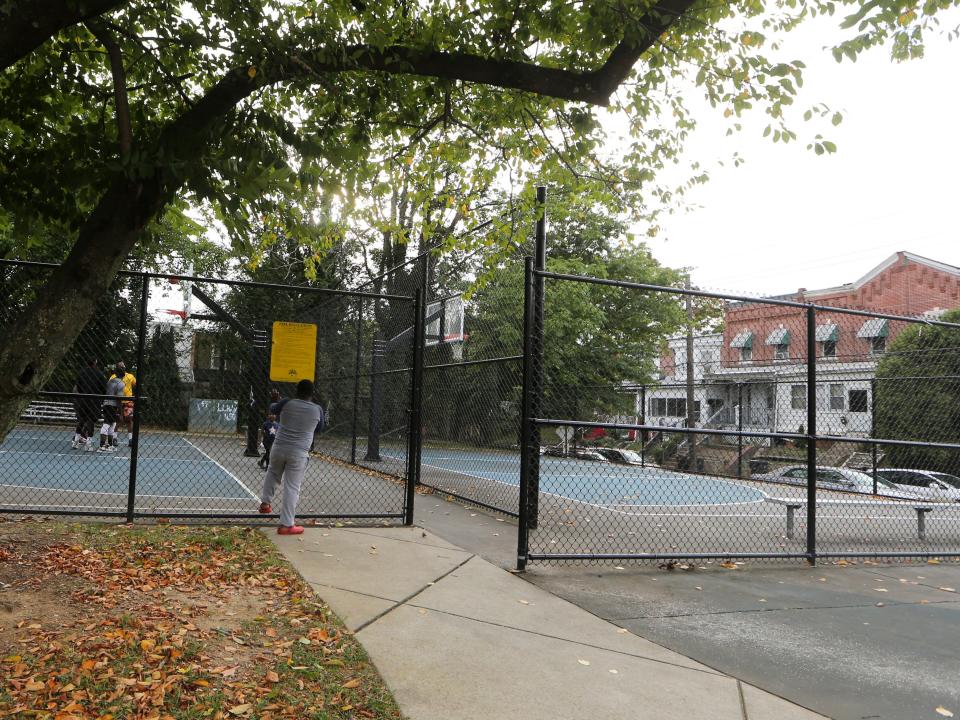
Now 74, retired and living in Pittsburgh – where Marley coincidentally performed his last concert before dying in 1981 at 36 – Cutler recently recounted the picnic.
Surprisingly, it's not a story he often tells.
Fellow News Journal writer Phipps had been invited to the picnic after her article on Booker appeared in the newspaper the year before and Cutler came along. The picnic was attended by friends, family and members of the city's Jamaican community. Marley's arrival wasn't as low-key as one might think.
That's because seven months earlier he survived an assassination attempt in Jamaica, suffering a gunshot wound to his chest and arm. His wife Rita survived a gunshot wound to the head and the seven gunmen who stormed their Kingston home were all tried and executed.
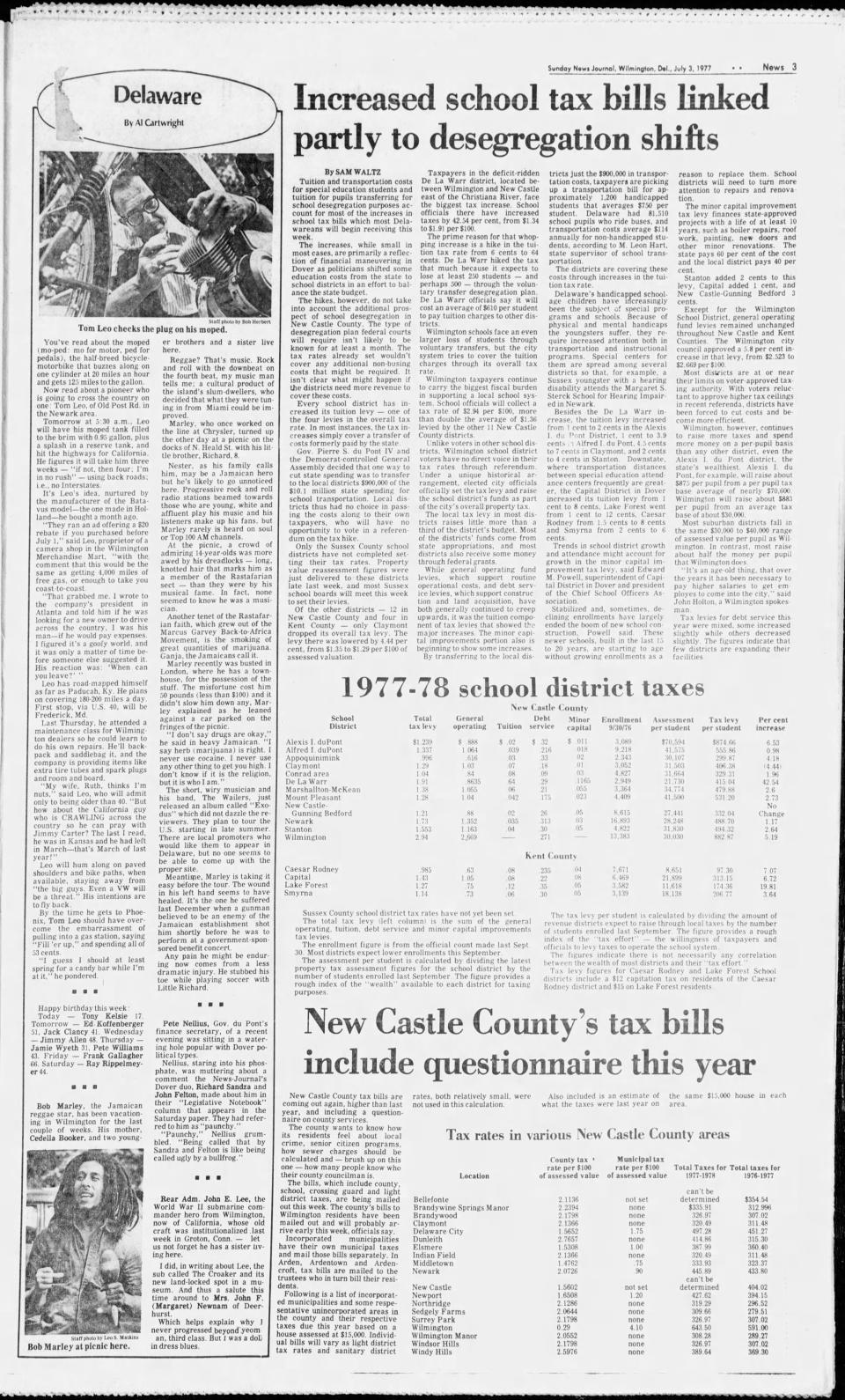
"It was almost like a Secret Service arrival in a dark van," Cutler said, recalling Marley's entrance to the picnic in a rundown part of town along the creek. "And when he came out, there was a giant cloud of smoke that came out with him, along with four or five really large dudes."
Marley was whisked away to a tent for a while and he eventually came out and spoke with Cutler and Phipps after he was told that they had been invited there to meet him.
As a rock writer, he knew he had to ask some questions about music. What he got in return was a five-minute speech about Rastafarianism in a thick Jamaican accent.
"We were left there thinking, 'Well that was interesting.' But he chose to be as distant as possible. He was barely tolerant of this intrusion," Cutler said. "Finally he indicated that the conversation was over and went back to his tent.
"Jennie and I sort of looked at each other and said, 'Should we eat some barbecue or get out of here?' We decided exiting would be the best move."
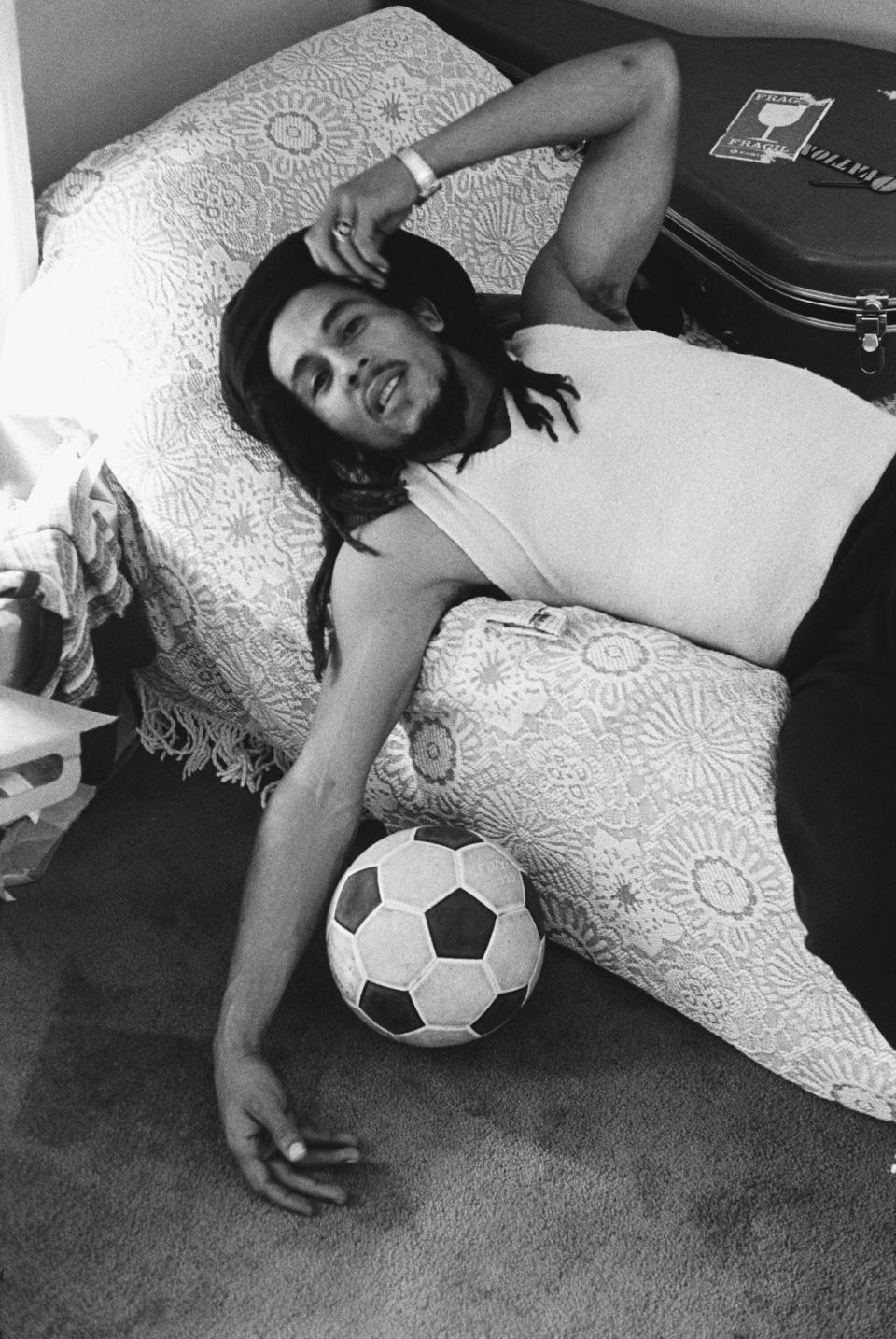
One thing Cutler remembers clearly was that Marley was extremely high when they spoke.
As a rock critic who regularly covered concerts both locally and in Philadelphia, sometimes with backstage passes, he had seen plenty of stoned rockers. But this was something else.
"If you smoke as much marijuana as he does with spliffs half the size of cigars, I figured you'd get used to it to a certain extent," Cutler said. "But he was stoned enough that he was really wrecked.
"I don't think I've seen anyone more stoned in my life with the possible exception of [Eagles guitarist and vocalist] Joe Walsh staggering past me backstage while walking on stage at a theater in Philadelphia once."
While Marley was partying in Wilmington that day, it went largely unnoticed until landing in the newspaper the next day.
Just like during all his years in town, Marley's name still wasn't on everyone's lips in town. In fact, three months later Brandywine Hundred native George Thorogood would release his debut album, becoming the city's best-known rocker.
Cutler makes an interesting note about the city's musical history.
With Marley as a former resident, Thorogood and jazz great Clifford Brown as native sons and multi-instrumentalist David Bromberg as a current resident, Wilmington's musical legacy is pretty strong.
"I'd be there for that with bells on!" Cutler joked, daydreaming about a fantasy concert featuring them all.
Bob Marley in a 'conservative bow tie'
For her part, freelance writer and former News Journal reporter Phipps, now 70 and living in Punta Gorda, Florida, remembers sitting with Booker in her home at 2313 Tatnall Street. (Marley purchased 2311 Tatnall Street as well and lived there on and off.)
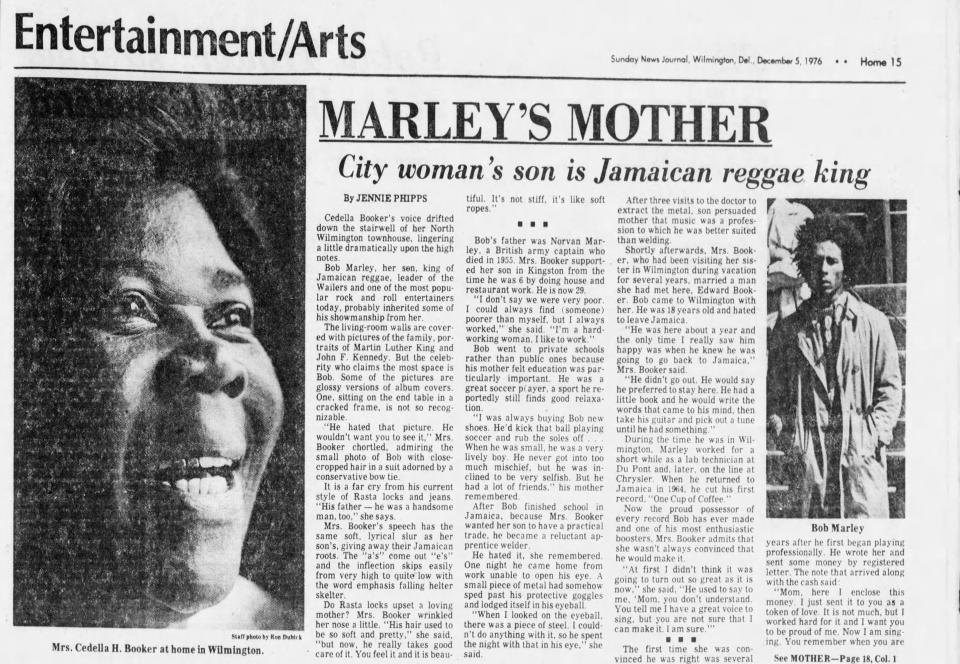
What sticks out the most to Phipps is something that she noted in the original report.
Booker's living room walls were covered with family photographs, along with portraits of Martin Luther King Jr. and John F. Kennedy. And sitting on an end table in a cracked frame was a photo of a young Bob Marley with close-cropped hair, dressed in a suit with "a conservative bow tie" like he was going to a prom.
Booker was laughing when she told Phipps, "He hated that picture. He wouldn't want you to see it."
Phipps said her interview with Booker, which was the first time most in Wilmington learned of Bob Marley's local connection, came after she bumped into her in public. Phipps lived only a few blocks away from Booker and after striking up a conversation and learning that she was Marley's mother, she asked for an interview and Booker agreed.
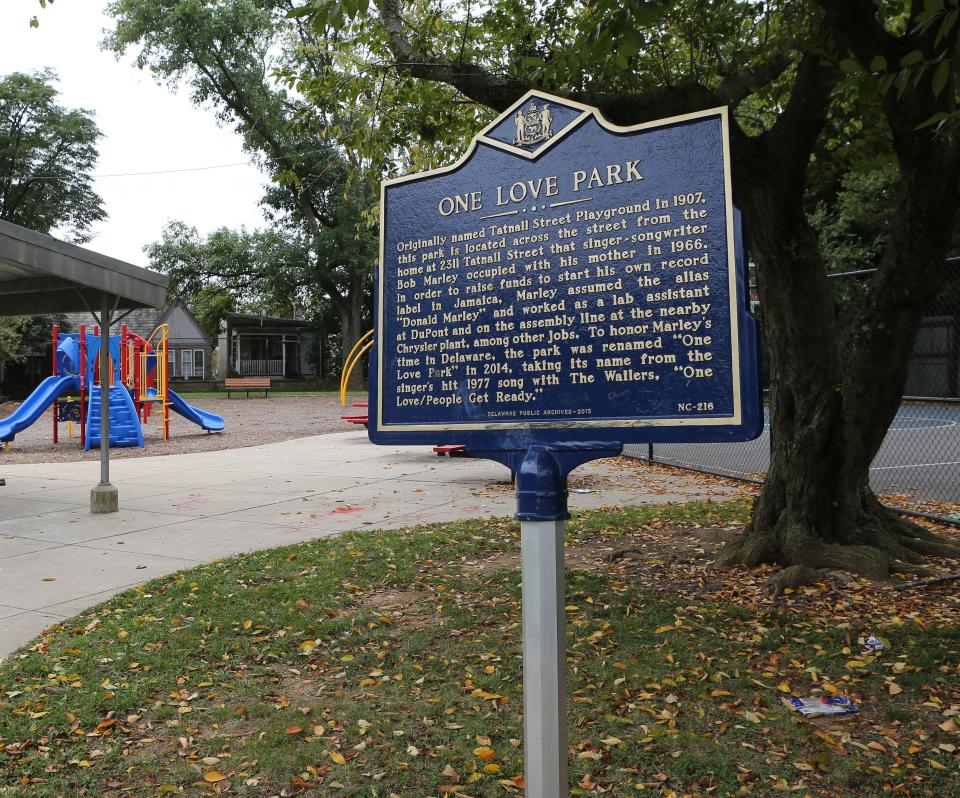
Most of all, Phipps left Booker struck by the ordinariness of it all.
"I thought of [Marley] as a rebel, a guy from the streets of Jamaica. But honestly, he grew up a lot in Wilmington and worked at the Chrysler plant," she said. "Yes he was a brilliant musician and rock philosopher, but I don't think he was that different than many of the other people who were growing up in Wilmington then."
In 2015, the Tatnall Street Playground across from Booker's former home was renamed One Love Park in honor of Marley and his time in the city, which never included a public performance in Wilmington.
The sign dedicating the park notes that Marley assumed the alias "Donald Marley" while working in Delaware.
Peoples Festival keeps Marley's legacy alive
It was in 1994 at Wilmington's Frawley Stadium when Pitts and his wife Genoveva "Genny" Pitts first launched Peoples Festival, 13 years after Marley succumbed to cancer.
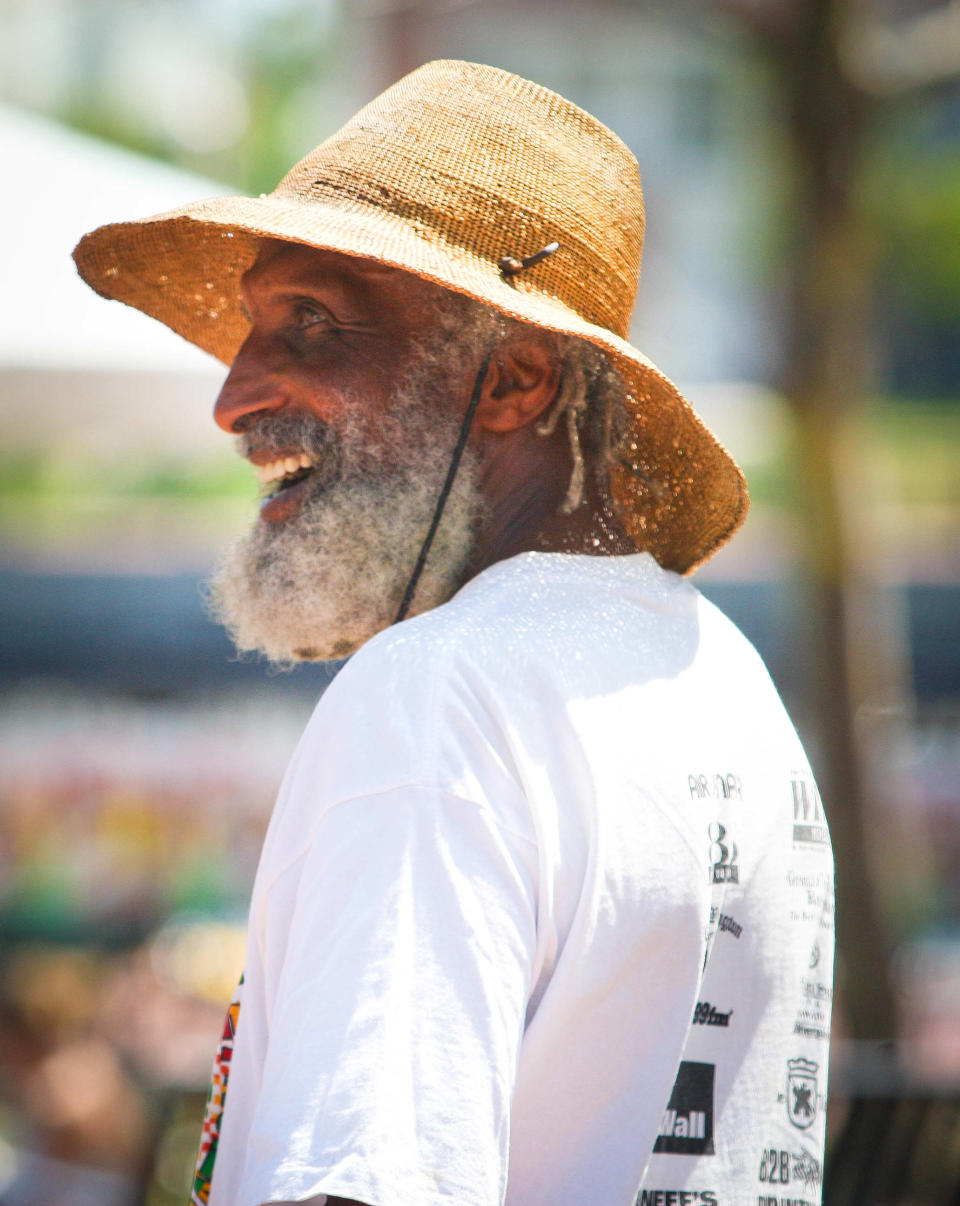
Booker would say her son's only friend in Wilmington was Ibis, according to Genny, first meeting him around 1968. Ibis owned an Afrocentric shop at 24th and Tatnall and Marley's wife Rita came in one day, barefoot.
"They hit it off. They had a lot in common," Genny said.
Rita told Ibis that she had a musician husband and said she would bring him to the shop one day. Well, that one day eventually came and the rest is history. The two would often get together to play music with Marley on guitar and Ibis on drums with Marley eventually becoming a fixture at the shop for a bit.
In fact, Bob, his mother and his wife were contracted to make jewelry for the store, leading to the hard-to-believe moment in 1969 of Bob Marley making jewelry in Wilmington the night before Woodstock.
Pitts first met Genny in California in 1974 and she met Marley for the first time a year later when Ibis brought her backstage to meet him at The Roxy in Los Angeles during his run of shows there.
And just like Ibis, once the then-pregnant Genny met Marley in person, she was immediately drawn to his aura.
"Something about his presence brought me to my knees, spiritually. I don't question it because it happened every time. He just humbled me to my core," Pitts said recently as she worked to finalize details for this weekend's festival, which drew more than 3,500 at its height when national acts would perform. (All of Marley's musical children, along with The Wailers, have performed in the past.)
After the festival wasn't able to use The Queen as its venue again this year, Pitts wondered if the Peoples Festival had run its course. But then an agreement was struck for it to return to Tubman-Garrett Park, where it had been previously held along the Christina River for several years.
In addition to music, the family-friendly event offers The Children's Village, Healing Garden, Bamboo Rain Hut, international food court, and a beer and wine garden.
It's been nearly 60 years since Marley first came to Wilmington and eight years since Genny's husband, who helped organize the festival, died at 69.
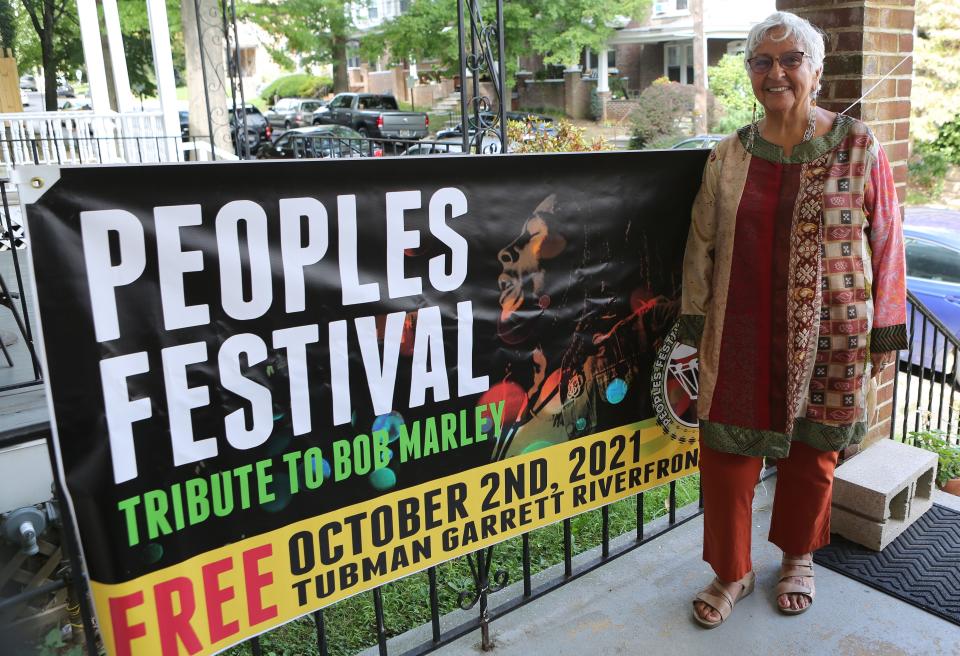
What keeps Pitts doing it?
The idea for the initial festival came from Booker herself, who made a surprise announcement at a party that the Pitts family would be the organizers.
As Genny puts it, "Being with Bob and that family, it was like being in a higher world. And this is an assignment from mother Booker. She didn't force it on me, but she trusted me. We just had this bond and it's still not broken."
Have a story idea? Contact Ryan Cormier of The News Journal a[email protected] or (302) 324-2863. Follow him on Facebook (@ryancormierdelawareonline) and Twitter (@ryancormier).
This article originally appeared on Delaware News Journal: In 1964, Bob Marley moved to Wilmington. He continued to visit through 1977.